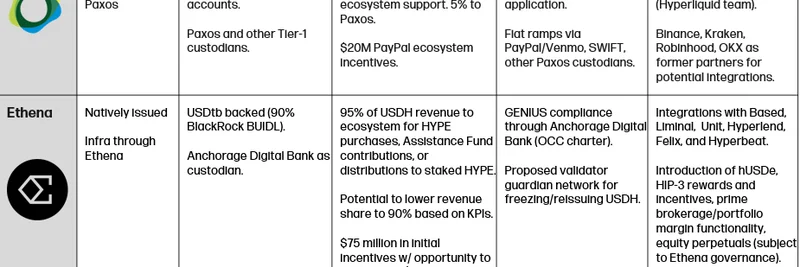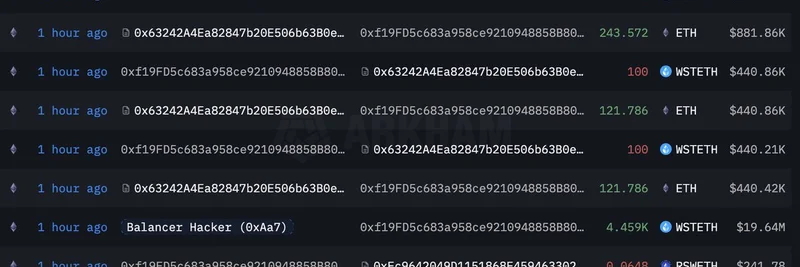Hyperliquid, the powerhouse decentralized exchange for perpetual futures built on its own Layer-1 blockchain, is gearing up for a pivotal governance vote. This Sunday, September 14, 2025, validators will decide who gets to claim the highly sought-after USDH ticker—a symbol that could become the go-to stablecoin on the network. If you're into meme tokens or DeFi, this matters because Hyperliquid is a hot spot for trading volatile assets like memecoins, and a native stablecoin could supercharge liquidity and keep more value within the ecosystem.
The buzz started with a thread from Lucas Tcheyan at Galaxy Research, highlighting how top stablecoin issuers have been lobbying hard. Hyperliquid currently relies heavily on USDC, with about $5.5 billion locked in, generating around $220 million in annual yield that mostly flows out to Circle and its partners. USDH represents a chance to flip that script, redirecting value back to Hyperliquid users through mechanisms like buybacks, ecosystem funds, and incentives.
The Voting Lowdown
This isn't just any vote; it's Hyperliquid's first big governance move beyond delisting assets. Validators, whose power is based on staked HYPE (the network's native token), need a two-thirds quorum to approve a winner. The Hyperliquid Foundation and Kinetiq, holding about 63% of the stake, are abstaining, putting the decision in the hands of independent validators. Proposals were due by September 10, and the vote kicks off at 10:00 UTC on the 14th.
Winning the USDH ticker doesn't mean instant domination. It grants the right to issue under that name and some symbolic clout, but adoption will hinge on building liquidity, integrations, and trust. Think of it as prime real estate in the crypto world—valuable, but you still have to develop it.
Breaking Down the Proposals
Several heavy hitters threw their hats in the ring, each with unique approaches to issuance, reserves, yields, compliance, and ecosystem ties. Galaxy Research compiled handy overviews (shoutout to their full piece for deeper dives). Here's a rundown based on the key contenders:
Native Markets
These folks are all about being "Hyperliquid-native." They'd issue USDH directly on the network through custom smart contracts already deployed on testnet and mainnet. Reserves? Cash and U.S. Treasuries managed by big names like BlackRock (offchain) and Superstate (onchain). Yield allocation splits 50/50 between Hyperliquid's Assistance Fund and growth initiatives like HIP-3 markets and HyperEVM apps. On compliance, they're pursuing GENIUS licenses and are flexible with regulations. Their deep integration includes advising Hyperion (HYPE's data co-op) and leading HyperEVM apps. Strengths: Ultra-aligned with Hyperliquid, innovative yield recycling. Weaknesses: Newer player, so execution risk is higher.
Paxos
Paxos brings established cred with native issuance via T-bills, repos, and USDC held in segregated accounts. They'd tier yields: TVL growth incentives up to 70%, Assistance Fund at 25%, and 5% to Paxos support. Compliance is their forte—GENIUS/MICA compliant with NYDFS trust and OCC charter. Integrations include PayPal, Venmo, and acquired Molecular Labs for Hyperliquid teamwork. Strengths: Proven track record, strong regulatory standing. Weaknesses: Less aggressive on yield sharing compared to others.
Ethena
Ethena's pitch? Native issuance backed by 90% USDTb from BlackRock's BUIDL, with Anchorage as custodian. They'd share 95% of revenue from contributions, Assistance Fund, and staked HYPE distributions. Initial incentives: $75 million, scaling to $150 million. Compliance via OCC-chartered Anchorage Digital Bank and proposed validators for USDH guarding. Ties include Limina, Unit, Hyperlend, and HIP-3 rewards. Strengths: Massive scale, high revenue share. Weaknesses: Reliance on USDT could introduce risks, and freezing/reissuing mechanics might raise centralization concerns.
Agora
Short-dated U.S. Treasuries, repos, and cash back this one, with State Street and VonEck handling custody. 100% of net revenue goes to the Assistance Fund and HYPE buybacks, plus $10M initial liquidity seeding. GENIUS Act compliant via Cross River and Customers Bank. Partnerships with Rain (credit cards), LayerZero (interop), Moonpay (consumer rails), and more. Strengths: Full revenue redirect, strong banking ties. Weaknesses: Newer in the space, potential for slower adoption.
Sky
Issued on Ethereum but bridged to Hyperliquid via Sky RWAs, CLOs, and non-crypto assets custodied by Melon, Fidelity, BlackRock, and Superstate. Yields: 4.85% through Sky Savings Rate, $25M initial funding for Hyperliquid-specific GENIUS compliant sDAI. Uses Basel III risk framework. Integrations lead to Sky's $8b+ deployment sheet into Hyperliquid and automated $35m+ annual buybacks. Strengths: Diversified portfolio, established MakerDAO roots. Weaknesses: Not natively issued on Hyperliquid, compliance not GENIUS yet.
Other proposals from Frax, Curve, OpenEden, and BitGo follow similar themes, emphasizing compliance, yield sharing, and integrations, but the field is splitting into "alignment-first" (led by Native Markets) and "experience-scale" camps (Paxos and Ethena gaining traction).
Why This Matters for Meme Token Enthusiasts
Hyperliquid isn't just for perps; it's a breeding ground for meme token trading, with spot markets and high-leverage plays. A well-executed USDH could mean better on-ramps, reduced bridging risks, and more yield funneled into ecosystem grants that boost meme projects. Imagine tighter spreads on your favorite dog-themed tokens or incentives for liquidity providers— this vote could indirectly fuel the next meme rally on the platform.
The Bigger Picture
No matter who wins, Hyperliquid comes out on top. Issuers are bending over backward, pledging unprecedented alignment and value shares. It flips the script: stablecoins need Hyperliquid's volume more than the network needs them. Validators face tough choices—prioritize native innovation or proven compliance? With execution risks high due to the rushed timeline, the outcome could set precedents for DeFi governance.
Stay tuned as the vote unfolds. If you're staking HYPE, consider redelegating to influence the direction. For the full breakdown, check out Galaxy's research linked above.



